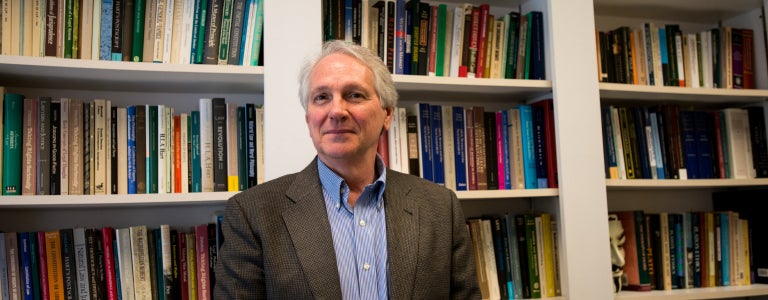The FEW Problem: What You Should Know
June 16, 2014—When you think of philosophy, the first thing that comes to mind may not be bioethics. But if you’ve ever considered the issues of climate change and access to resources, you’ve already dabbled in bioethics—a field that Professor of Philosophy Madison Powers describes as “the heart of philosophy.”

Professor Madison Powers is the author of FEW Resources, a website devoted to understanding the bioethical challenges surrounding access to food, energy, and water. Photo by Melissa Nyman.
Bioethics explores challenging moral issues that arise from advances in biology and medicine, emerging technologies, and environmental changes. According to Powers, an interest in bioethics means you are interested in questions of the individual versus the collective—questions that are at the core of philosophical studies.
Powers specializes in these very questions as they pertain to global justice and the environment. One of his key areas of focus centers on the interconnected challenges of food, energy, and water (FEW)—otherwise known as the “FEW Problem.”
Powers is the author of FEW Resources, a website devoted to these three key resources and the global challenges they present. Launched in 2013, the site quickly earned an international following that continues to grow. In May, FEW Resources received more than 15,000 unique visits from numerous countries around the world.
But Powers’ interest in environmental work—and questions of justice—goes back to the beginning of his career and his background in law. Before becoming a philosopher, Powers worked as a lawyer and focused on environmental issues like the Clean Water Act. His professional advocacy soon grew into a passion to explore global challenges that affect human health and the viability of the human habitat.
It’s that same passion that ultimately lead Powers to found FEW Resources—thanks, in part, to his students. As he prepared to teach an undergraduate course about global justice and the environment, Powers felt he needed to gather information about the science of the environmental issues so that his students could come up to speed on the facts.
The idea, Powers says, soon morphed into a much larger project. After extensive research, Powers catalogued articles and information that presented the facts clearly and concisely, and then built a website to make these resources available. His website operates as an unofficial FEW encyclopedia.
But while he knew the site was robust, Powers never expected it would gain such notoriety. Now, he receives around 100 emails a month from people all over the world who send inquiries, suggestions, and ideas.
The attention is, perhaps, a sign that people are noticing the crucial issues surrounding the FEW Problem.
“The world is running out of access to clean water—and climate change will only exacerbate that,” Powers said. “As the population grows, resources are shrinking, and a global struggle will impact, negatively, the world’s poorest, most vulnerable individuals.
“Climate change may be the biggest global justice problem humankind has faced in many years, if ever, because it’s potentially an existential threat for many parts of the world,” he continued.
Powers also predicts that the problems presented by FEW are the foundation for the next wave of environmental ethics. For his part, Powers is in the midst of writing his next book with co-author Ruth Faden, the Philip Franklin Wagley Professor of Biomedical Ethics at Johns Hopkins University. The book will explore issues of deprivation, disadvantage, and cross-border duties of justice.
Powers also serves as a senior research scholar at Georgetown’s Kennedy Institute of Ethics. The institute recently hosted its 40th annual Intensive Bioethics Course, which offers lectures and small group discussions on key principles of bioethics.
In between teaching and working with the Institute, maintaining FEW Resources is a near-constant activity for Powers. The site is updated weekly and has become what Powers calls “a philosophical engagement.” And, because of the inextricable link between FEW and climate change, the need for this dialogue, and a forum like FEW Resources, will likely only increase in the coming years.
Powers emphasizes that how we respond to FEW now will directly impact our ability to both mitigate and adapt to climate change. For him, the bottom line is clear: If you’re interested in climate change, you should be interested in food, energy, and water.
“While climate change is the obvious environmental problem,” Powers said, “it bears on all three of these issues, and all the problems that are emerging on these three issues bear, in turn, on how we adapt to climate change.”
—Melissa Nyman